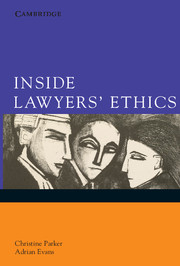Book contents
- Frontmatter
- Contents
- Preface
- Acknowledgments
- List of tables
- List of figures
- List of illustrations
- List of case studies
- Table of statutes
- Table of cases
- 1 Introduction: Values in Practice
- 2 Alternatives to Adversarial Advocacy
- 3 The Responsibility Climate: Regulation of Lawyers' Ethics
- 4 Civil Litigation and Excessive Adversarialism
- 5 Ethics in Criminal Justice: Proof and Truth
- 6 Ethics in Negotiation and Alternative Dispute Resolution
- 7 Conflicting Loyalties
- 8 Lawyers' Fees and Costs: Billing and Over-Charging
- 9 Corporate Lawyers and Corporate Misconduct
- 10 Conclusion – Personal Professionalism: Personal Values and Legal Professionalism
- Index
- References
6 - Ethics in Negotiation and Alternative Dispute Resolution
- Frontmatter
- Contents
- Preface
- Acknowledgments
- List of tables
- List of figures
- List of illustrations
- List of case studies
- Table of statutes
- Table of cases
- 1 Introduction: Values in Practice
- 2 Alternatives to Adversarial Advocacy
- 3 The Responsibility Climate: Regulation of Lawyers' Ethics
- 4 Civil Litigation and Excessive Adversarialism
- 5 Ethics in Criminal Justice: Proof and Truth
- 6 Ethics in Negotiation and Alternative Dispute Resolution
- 7 Conflicting Loyalties
- 8 Lawyers' Fees and Costs: Billing and Over-Charging
- 9 Corporate Lawyers and Corporate Misconduct
- 10 Conclusion – Personal Professionalism: Personal Values and Legal Professionalism
- Index
- References
Summary
Introduction
The standard conception of lawyers' role and ethics revolves around a combination of advocacy on behalf of clients and responsibilities to the court. Yet only a small proportion of lawyers devote a substantial amount of their practice time to litigation. Most disputes do not go all, or even part of the way, to trial. The vast majority of problems that could lead to legal proceedings are handled without recourse to law, lawyers or any other form of organised dispute resolution at all. Even where people do seek legal advice and commence court proceedings, most civil disputes are settled or ‘compromised’ through negotiation before the dispute goes to trial.
Most lawyers are not involved in litigation on a regular basis, but all lawyers are likely to negotiate on behalf of clients on a daily basis, whether to settle a dispute, or conclude a contract or deal. These negotiations can be a purely private affair between the parties and their lawyers. Or negotiation can occur through a variety of methods of ‘alternative’ dispute resolution (ADR). We use the term ‘ADR’ here to include any processes in which neutral third parties (other than courts) intervene to either help parties reach a settlement, or to determine a dispute. ADR can be aimed at avoiding the need to use lawyers or court by helping people to settle their disputes as soon as possible after they arise – for example, customer or workplace complaints schemes within commercial and government organisations, external ombudsman schemes and complaints commissioners, neighbourhood or community justice centres, some commercial mediation and arbitration, and preventive dispute management systems.
- Type
- Chapter
- Information
- Inside Lawyers' Ethics , pp. 120 - 150Publisher: Cambridge University PressPrint publication year: 2007



